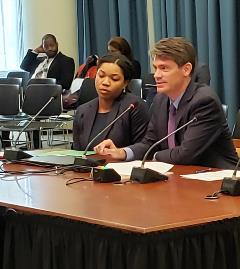Health Equity
Medicaid Enrollment Touches 39% of the Residents of The District of Columbia; DC’s 70/30 FMAP is Vital for the Maintenance of Health & Human Services
A reduction in the District’s FMAP would not lead to long-term government savings and would have a ripple effect throughout the entire health system in the DMV, crippling access to care for not only Medicaid beneficiaries but also all those who live, work, and visit the District of Columbia, including members of Congress and their staffs.
.png?sfvrsn=9ac2d21b_0)
Why does DC receive an Enhanced FMAP Rate?
The DC FMAP rate of 70% established by the Revitalization Act resulted from bipartisan analysis, discussion, and negotiation by Congressional leadership aiming to balance fairness with the District’s restricted ability to generate revenue. Congress recognized that the District of Columbia faces unique financial challenges due to its non-state status and the significant amount of federally-owned land within its boundaries. The District is unable to tax non-residents’ earnings, so these workers pay no taxes to support the infrastructure and services, such as roads, public safety and emergency services that they benefit from in the District. The District is also unable to tax up to 40% of the real property within its borders due to statutory restrictions.
Why are we concerned about DC's FMAP now?
Members of Congress have proposed reducing the DC FMAP to the statutory minimum for all other states, which is currently 50% (but could be reduced even more). Such a change would impact every physician and every practice, regardless of type, location, and payers contracted. Even practices who take no insurance will not be able to send patients for specialist care, hospital admissions, or other types of care.
What can MSDC members do?
- If you know a member of Congress or staffer, reach out to them and share how DC cuts will hurt your patients.
- Share your relationships and outreach with hay@msdc.org so we can help coordinate advocacy efforts.
- Email hay@msdc.org if you would like to be paired with a physician member of Congress office and trained by MSDC staff on how to reach out.
Resources
- DC FMAP cut fact sheet
- California Medical Association fact sheet on Medicaid cuts
- MSDC and healthcare association letter to Congress arguing against DC FMAP changes.
- MSDC original story on Medicaid changes.
News, Statements, and Testimony on Health Equity Issues
Committee on Health Passes Biosimilars, Pregnancy Coverage Expansions

Today, the Committee on Health passed B23-430, the Access to Biosimilars Amendment Act of 2019, as part of a seven bill and one resolution mark-up.
B23-430 is a "priority support" bill on the MSDC legislative agenda. As introduced, Bill 23-430 authorizes licensed pharmacists to dispense interchangeable biological products, and requires notifications to physicians when such interchangeable biological products are dispensed. The bill will permit physicians and patients to find affordable, effective treatments for many common conditions. MSDC member Dr. Angus Worthing testified in favor of the bill during the fall hearing on the bill.
In addition to the biosimilars bill, the committee advanced two bills that would increase coverage during pregnancy. The first bill, B23-326, the Postpartum Coverage Act of 2019, extends postpartum inpatient and outpatient benefits to at least a year after childbirth. The second bill, B23-584, Pregnancy as a Qualifying Event Act of 2019, requires health insurers to provide a special enrollment period after commencement of a pregnancy. It allows a person to enroll in or change their health insurance outside of the open enrollment period upon pregnancy.
The highest profile bill passed by the committee is B23-777, the New Hospital at St. Elizabeth's Act of 2020. The markup comes the day after a nine-hour hearing on this bill and the new Howard University Hospital bill. MSDC testified at this hearing, as you can see here.
Other bills passed from the committee include:
- B23-0322, Window Blind and Drape Cord Safety Notification Act of 2020
- B23-0546, Interstate Physical Therapy Compact Approval Act of 2020
- B23-0565, Hearing Aid Sales Amendment Act of 2020
- Appointment of Michelle R. Loggins to Committee on Health Approval Resolution of 2020

Leave a comment